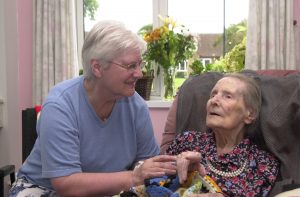There are now an estimated 8.8 million adult carers in the UK, up from 6.3 million estimated in the 2011 census. That’s a huge increase in numbers.
 And they are seven times more likely to be lonely compared with the general public, new figures suggest.
And they are seven times more likely to be lonely compared with the general public, new figures suggest.
They also feel that what they do in life is significantly less worthwhile compared with the rest of the population, with those struggling financially are over a third less likely to feel that the things they do in their life are worthwhile. (Research released for Carers Week 2019).This is despite the vital support they provide their loved ones and their enormous contribution to society.
SO HOW CAN WE HELP? One of the talks my colleagues and I are asked to give in churches and faith groups is how to best support carers like these. And in ‘Worshipping with Dementia’, after consulting with experts (including caregivers themselves) I wrote:
SUPPORTING THE CAREGIVER
The majority of caregivers are elderly spouses. Others are daughters; sons, or other close relatives, and still others are friends. They are on duty 24 hours a day, seven days a week, 52 weeks a year, often only poorly supported by others, including social care. Experts recommend that caregivers arrange respite care for their loved ones, and always bear in mind that nursing, or residential care will be inevitable at some stage. In the meantime, caregivers can seem to disappear from sight, especially of their church fellowships, as they become more and more restricted by the demands of caring. Research shows that the toll is so great that it takes an average of seven years off the lives of caregivers. They need empathy, love, and practical and spiritual support. Here are some things you can do.
- Don’t allow the caregiver to be forgotten by the fellowship. Keep both them and the sufferer high on the church prayer list. Become their champion – motivate people to visit and take an interest. Be their voice when they are too exhausted or preoccupied to speak for themselves. Let them know that you are there for them. Arrange to call at intervals, especially if you haven’t heard from them in that time.
- Be available to talk on the phone, and to visit. Give them your telephone number and times when you won’t be available.
- Learn as much about the sufferer and his or her routine as you can, so you can offer regular periods of relief. Even mini ‘respite- breaks’ make a huge difference.
- In conversation with the caregiver, don’t engage in criticising or speaking negatively about church life, but keep him or her aware of what is happening so they feel they still belong.
- Set up a support system so the caregiver can get to one of the Lord’s Day services on a fairly regular basis. To soak in God’s Word and be amongst His people is a great source of strength and encouragement. It helps restore emotional equilibrium.
- Find out if a church ‘buddy’ could be helpful. Perhaps someone of the same sex to take the person to the toilet if necessary, or simply to sit alongside them and help with whatever needs doing.
- Make Christian audio recordings – DVDs and CDs available to them, even though their opportunity to listen and watch may be limited.
- Ask the caregiver to make a list of things the fellowship could help with. It could be cutting the grass, in the summer time, or collecting prescriptions, or helping with the shopping.
- The demands of caring can eat into personal time and private devotions can easily, and unavoidably, be missed, so encourage spiritual thought in your conversation.
- As well as visits to the person with dementia, encourage visits specifically to the caregiver. It can be so demoralising to be seen as the ‘sufferers caregiver’, and not as a person who is loved and valued in their own right. A low sense of personal worth is a debilitating trait that is common amongst caregivers.
- Check that the caregiver has a good diet. Sometimes exhaustion means not being bothered with eating healthily.
- Involve the caregiver in your spiritual activities when you visit the frail or confused person, If possible, take a short while afterwards to pray with the caregiver alone. Don’t be afraid to pray about the situation and the burdens of caring.
- When you spend extended time alone with the caregiver be prepared to discuss his or her problems and feelings. Encourage them to focus on the positive aspects of caring, as a service to Jesus Himself, and a calling from Him. Matthew 25:40 applies here, too. Listening is vital. Active listening has tremendous therapeutic value, as does validating the person’s sense of the situation. Never criticise, or suggest they are spiritually lacking because of the negative aspects of some of their feelings. Encourage them to take a ‘helicopter’ view, looking at events in the light of eternity.
- Don’t expect the caregiver to have time to be reading Christian books. Free time is at a premium. Only bring books and leave them if the caregiver has said they have time, and are able to concentrate on reading. A loaned book that cannot be read can become a burden and a rebuke.














